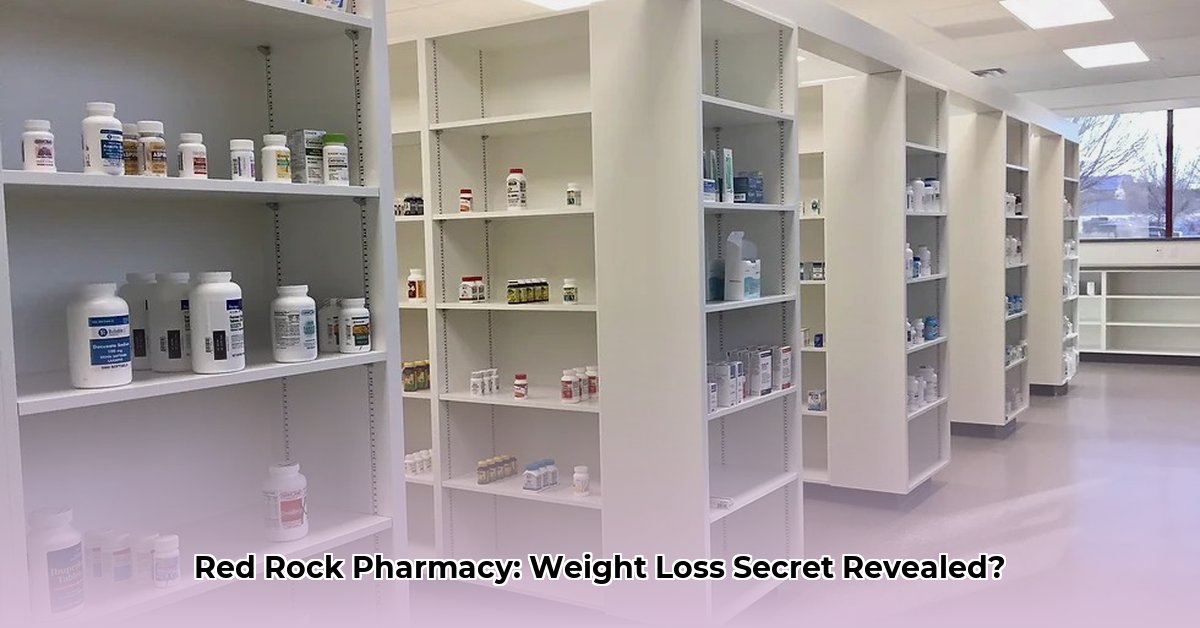
Losing weight is a common goal, and many seek assistance through online programs. Red Rock Pharmacy offers one such program, promising convenience and affordability. However, a thorough evaluation reveals significant concerns regarding its safety and efficacy.
Understanding the Red Rock Pharmacy Weight Loss Program
Red Rock Pharmacy's program operates entirely online. Users complete an online form, consult virtually with a healthcare professional, and receive medication. While this convenience is attractive, the effectiveness and safety of this approach require careful scrutiny. The program utilizes telemedicine, offering remote care. While this can be beneficial, it also presents unique challenges.
Accessibility and Affordability: A Balanced Perspective
The program's initial cost of approximately $295 appears low. This includes medication, shipping, supplies, and the initial consultation. This accessibility is positive, considering the high prevalence of obesity (around 40% of the US population, according to the CDC). However, this low cost raises questions about potential compromises in care quality or medication type. Further information is needed to fully assess this aspect. Does the low cost reflect a lower standard of care?
Regulatory Concerns: The Absence of FDA Approval
A significant concern is Red Rock Pharmacy's open admission that its products lack FDA approval. FDA approval ensures medication safety and effectiveness. This absence raises serious questions about potential risks and the program's long-term viability. The lack of FDA oversight poses a significant regulatory hurdle. What are the potential health consequences of using unapproved medications?
Medication Management: Potential for Delays and Disruptions
The program utilizes medications from compounding pharmacies. While compounding allows for customized medications, it can lead to longer processing times compared to traditional pharmacies. The program typically provides 6-8 weeks of medication. Delays in refills could disrupt treatment and negatively impact results. How will the program address potential medication supply chain issues?
Transparency: A Critical Deficiency
A major drawback is the lack of detailed information. The specific medications used are not disclosed, nor are clear patient eligibility criteria. Crucially, verifiable data on the program's effectiveness is absent. This lack of transparency hinders a comprehensive assessment of its safety and efficacy. How can consumers make informed decisions without access to crucial data on outcomes?
Weighing the Pros and Cons of Red Rock Pharmacy Weight Loss
The following table summarizes the program's advantages and disadvantages:
| Pros | Cons |
|---|---|
| Relatively low cost | No FDA approval for products |
| Convenient online platform | Potential delays in medication delivery |
| Simple three-step process | Limited information on medications and program effectiveness |
| Potentially accessible to a large population | Uncertain future due to regulatory concerns and lack of transparency |
Improving the Program: Recommendations for Enhanced Practices
To enhance trustworthiness, Red Rock Pharmacy must address the absence of FDA approval. Obtaining approval or a similar certification would significantly bolster public confidence. Implementing a transparent system for collecting and sharing outcome data is crucial. This involves rigorous tracking of patient results and making this information readily available. Diversifying revenue streams and expanding the healthcare professional team could also improve long-term sustainability. These changes are essential for establishing credibility and ensuring responsible healthcare practices. Is the company committed to addressing these shortcomings?
A Cautious Outlook: The Need for Informed Decision-Making
Red Rock Pharmacy's program offers a potentially convenient and affordable option. However, the lack of crucial safety and effectiveness information raises serious concerns. Without data and FDA approval, the long-term success and safety of this program are uncertain. Before using this or any weight loss program, consult your physician for personalized guidance. Effective weight management often involves lifestyle changes. This program, if used, should be part of a broader, physician-supervised strategy. What are the potential long-term health risks associated with this program's weight loss approach?
How to Ensure FDA Compliance for Telemedicine Weight Loss Programs
Key Takeaways:
- Thorough due diligence is essential before engaging with any telemedicine weight loss program.
- HIPAA compliance is paramount for protecting patient data privacy.
- Adherence to state-specific licensing and practice requirements is crucial.
- All marketing claims must be truthful and evidence-based.
- Meticulous record-keeping is vital for demonstrating compliance.
- Staying updated on evolving FDA regulations is necessary for ongoing compliance.
The rise of telemedicine has revolutionized healthcare, including weight management. This convenience, however, necessitates strict adherence to regulations. Let's examine how to ensure FDA compliance for telemedicine weight loss programs.
Understanding FDA Jurisdiction in Telemedicine Weight Loss
The FDA's role is not always straightforward. While focusing on drug manufacturing and marketing, their oversight extends to providers making claims about the efficacy of telehealth services, particularly those involving compounded medications or supplements. Navigating the line between legitimate health advice and unsubstantiated claims requires careful attention.
HIPAA Compliance: Protecting Patient Data
Protecting patient data is crucial. HIPAA mandates stringent measures for safeguarding electronic protected health information (ePHI), including encryption and secure storage. Employee training on HIPAA is vital to prevent breaches. Are your security measures robust enough to prevent unauthorized access to patient information?
State-Specific Regulations: Navigating a Complex Landscape
Each state has unique licensing requirements, telehealth practice standards, and data privacy laws. Thorough research is needed to ensure compliance in each state of operation.
Marketing and Advertising: Truthfulness in Claims
The FTC and FDA closely monitor advertising for weight loss programs. Exaggerated or misleading claims are prohibited. Legal review of all marketing materials is essential.
Record Keeping: A Foundation of Compliance
Maintaining detailed records of all patient interactions, treatments, and progress notes is vital. These records protect the program and ensure patient safety.
Continuous Monitoring: Adapting to Regulatory Changes
The regulatory landscape continually evolves. Staying updated on FDA guidelines is crucial for maintaining compliance. Proactive adaptation to these changes is essential.